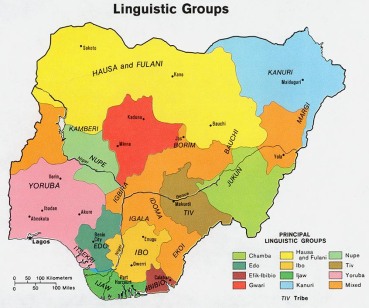As I described in my previous post, Nigeria is a multicultural country with over 250 ethnic groups. There are varying beliefs on how many languages are spoken in Nigeria. Ethnologue says 520 living languages are spoken in Nigeria, the U.S. English Foundation claims 471, and Nairaland says the real language count is closer to 70 and that the other “languages” are really just different dialects. The official language is English, but Hausa (21% are L2 speakers), Yoruba (21%) and Igbo (16%) have semi-formal status.

The Executive Secretary of the Nigerian Educational Research Development Council Godswill Obioma has prioritized saving indigenous languages from extinction (primarily caused by westernization and globalization). Godswill Obioma has called for a more strict enforcement of Nigeria’s policy on education. This policy states that children should be taught in the “mother tongue or the language of his or her immediate community for the first three years of primary schooling” according to the U.S. English Foundation.
There are some problems when it comes to divisions between ethnic groups and how they differentiate themselves. For example, Kanuri and Manga speakers from northeastern Nigeria can easily communicate with each other. In the Kanuri majority city Maiduguri (which is about 100 miles south of Manga-speaking areas) Manga is seen as a separate language from Kanuri. The Manga and Kanuri who live next to each other don’t see themselves as being from different ethnic groups, but people who live far away do.
The use of English as an official language helped solve a difficult problem for politicians in Nigeria. In Nigeria, there is no politically neutral language because choosing to speak in Hausa, Yoruba or Ibo would be showing preference for a specific region. Due to this, the government does not actively promote one of these languages and instead uses English. Nigerian nationalist and Chief Anthony Enahoro said, “All the languages of Nigeria have equal validity, or if you please equal lack of validity, before the law and under the constitution. No linguistic group has the right – the moral or constitutional right – to impose his language on any other linguistic group in the country.”
Nigeria joined the United Nations on October 7, 1960. In 2013, Nigeria provided the fifth largest number of peacekeepers to United Nations peacekeeping operations. At the moment, United Nations is adjusting the border of Nigeria and Cameroon.
Nigeria became a part of the International Monetary Fund on March 30, 1961. The International Monetary Fund agreed to a two year “policy support instrument” in October 2005 in order to help the growth of the non-oil sector and reduce poverty in Nigeria. Currently, Nigeria is facing some economic problems due to the decreasing oil prices and they may seek a loan from the International Monetary Fund.
Nigeria joined the World Trade Organization on January 1, 1995. In recent years, many people have called for Nigeria to leave World Trade Organization. Nigerians in America says that “taking full control of developing countries’ food and agriculture became the greatest weapon WTO handed to the west.” Nigerians in America go on to say that the World Trade Organization’s rules of agriculture and food have mostly been decided by the QUAD countries (US, Canada, Japan and the EU) behind closed doors. “The liberalization of market by the World Trade Organization is having negative impact on the Nigerian economy because of lack of regulation by the government,” said Managing Director and Chief Executive Officer of Adhama Textile, Kano, Alhaji Dattijo Adhama.